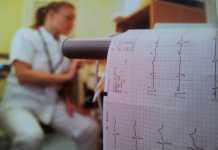March 2003 - Mental stress causes a rise in blood pressure that lasts longer in lower-class workers than upper-class workers, leading to a greater risk of heart disease or stroke.
High blood pressure has been linked to increased risk of cardiovascular disease across broad population groups, and cardiovascular disease is the No. 1 killer of Americans every year. About 50 million people in the United States have high blood pressure, at an estimated health care cost of $50 billion.
The new research marks the first time a study has measured blood pressure as well as the volume of blood pumped by the heart for any significant amount of time after a subject experienced mental stress, according to the researchers.
The time that it takes a person to recover from a blood pressure increase after a stressful event "appears to be associated with heightened disease risk," writes Andrew Steptoe, D.Phil., professor of psychology at University College in London and lead author of the study, which appears in the March issue of Psychophysiology.
The researchers studied 200 men and women, age 47 to 59, dividing them based on occupation into high, intermediate or lower socioeconomic status groups. All of the study participants were British civil service workers and none had a prior history of heart disease or high blood pressure.
Continue Reading Below ↓↓↓
Participants were asked to limit their intake of caffeine, alcohol and tobacco in the hours before the study. The researchers collected baseline measures of blood pressure and other cardiovascular data and then administered two mental stress tests. One of the tests involved a computerized task involving color associations and the other required tracing a mirror-image of a shape under time pressure. The participants' blood pressure and heart rates were monitored throughout the testing.
Following the stress tests, the researchers recorded measurements of each participants' blood pressure and heart rate for five minutes at two points - first 15 minutes post-test and again 40 minutes after the test ended.
All participants showed an increase in both heart rate and blood pressure during the tests. Blood pressure levels and heart rates decreased after the stressful tasks were completed, but participants in higher socioeconomic groups returned to normal levels more quickly than those participants of lower socioeconomic status.
"We know that blood pressure stress responses are produced by a combination of increases in the force of pumping of the heart (cardiac output) and increases in the resistance of blood vessels to the flow of blood (peripheral resistance)," Steptoe explains. The finding that heightened blood pressure levels among participants in lower socioeconomic groups are tied to increases in blood vessel resistance "is potentially important, since high peripheral resistance is linked to increased risk of cardiovascular disease," he adds.
The overall importance of the study, Steptoe notes, is "that the important factor is not how intensely you react to stress, but how quickly you adapt and return to normal after the stress is over. Our work shows that those in less-affluent positions take longer to adapt with potentially damaging biological changes that linger in the body."
The research was supported by the Medical Research Council, UK.
Source: Health Behavior News Service









